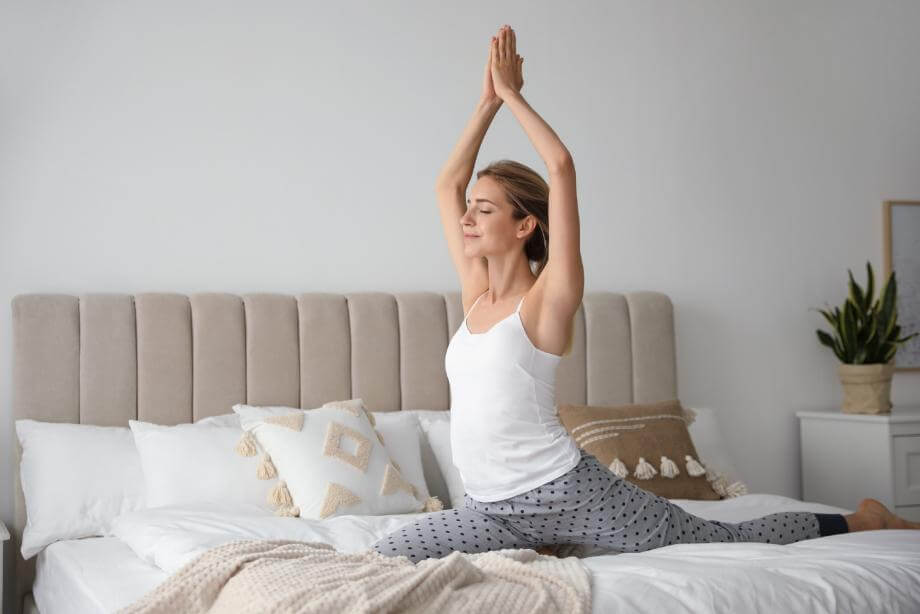Are you suffering from stress? 5 tips to a carefree sleep

Ever had that feeling of worry when going to bed and you just can't seem to fall asleep? You know you have to go to sleep soon because you have a busy day tomorrow. But so many thoughts are still going through your mind that you can't drift off. Rest assured, you are not alone! When you are busy with "having to" fall asleep, your stress hormones are activated. We are happy to give you some tips to keep stress out of the bedroom.
To be able to fall asleep without worry, you first need to know why you can't fall asleep. In a previous blog, we gave you some tips to combat insomnia: go to sleep at regular times, put your mobile phone away, avoid alcohol before going to bed, do not have an intensive and vigorous sports session in the evening, etc. But what if you already follow this advice to the letter? Then stress could be the cause of your insomnia!
Stress and sleep: an exhausting interaction
Stress is often the culprit: our body receives an enormous amount of stimuli from work, family, technology, traffic, etc. Stress symptoms such as tension, worry, and anxiety can upset our entire body including our sleep hormones. Stress makes your sleep worse and poor sleep makes the stress worse, a tricky interaction. Here are some tips to break this vicious cycle.
1) Relax
It sounds logical that you need to stop fretting in order to fall asleep, but that's easier said than done! Maybe music can help you relax? As a child, how often were you sung to sleep with ‘rockabye baby on the treetops…’? The reason for this: relaxing and soothing music stimulates the brain and makes us fall asleep more easily. The song you should put on your sleep playlist is 'Weightless' by Maraconi Union. The piano, guitar and soft sounds in this song will make you start to doze off. The rhythm is familiar to a heartbeat which prepares your brain to go to sleep.
Have you tried listening to a podcast? Listening to the right soothing podcast in bed might transfer you to dreamland with effortlessness.
2) Put pen and paper on your nightstand
Write off that stress. Are you still mulling over things you need to remember or tasks that need to be done the next day? With a notebook and pen on your nightstand, you can write everything down and let go of the tension more easily. Or are emotions popping up just before going to sleep? Sometimes a certain event springs to mind, and you start thinking about how you could have handled everything differently. If so, a ‘night thought book’ could be the thing for you and help you to organise your thoughts! In the evening and through the night, your thoughts can seem extremely large and dramatic. By writing them down, you can let go of your fears and emotions more easily by giving them a place on paper rather than in your mind.
3) Opt for a gentle form of exercise in the evening
Exercise is important for our health, and it also has a positive impact on our sleep! Even though we advise against intense exercise in the evening, opting for a gentle form of exercise is better than crossing sports off the to-do list altogether. Exercising allows you to clear your head and release tension. If you do opt for an intense sport in the evening, for example, if you play in a team and have no other choice, it is important to finish your workout with stretching exercises. By stretching you focus on your breathing, which makes you relax. Also, take a hot shower or a hot bath to relax your muscles and to induce a sleepy feeling.

4) Opt for yoga or ratio breathing
You can also try some mindfulness exercises right before going to bed to lower your stress levels. Yoga and meditation help to regulate your adrenaline and dopamine levels, among other things, making you fall asleep easier. Breathing is the key to success! In yoga, you try to hold a certain pose for 30 seconds, which is equivalent to five deep breaths. Just a few minutes of yoga can put a stop to your thoughts.
Is yoga not your thing at all? Try to pay attention to your breathing with exercises such as ratio breathing. During this exercise, you exhale twice as long as you inhale, which will calm your nervous system. A super simple exercise, and very effective for de-stressing!
5) Avoid caffeine and sugar an hour before bedtime
Your diet and food choices can also cause or aggravate stress. In stressful periods, it is tempting to opt for fries, pizza, or pie. Comfort food can bring you comfort for a short while, but it has the opposite effect in the long run.
When you eat products with a lot of sugar, you get spikes in your blood sugar level. The moment of joy is short-lived, because when the sugars wear off, you suddenly get a dip.
If you have trouble falling asleep, it’s best not to drink a cup of coffee right before going to bed. Caffeine activates the stress part of your nervous system and makes your sleep problems worse. Instead, choose a cup of herbal tea without caffeine.
Don’t forget the most important thing of all!
To relax your body completely, you need a bed that supports your body in the right way. The Ergosleep® bed can be adjusted according to your SLEEP DNA® and this is precisely why you will get a better night’s sleep. Make an appointment with an Ergosleep® dealer and have your SLEEP DNA® measured.